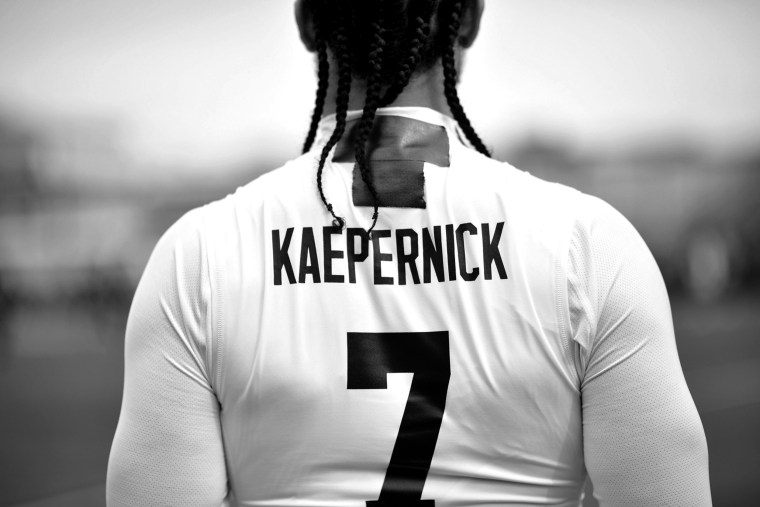On Sept. 22, the Denver Broncos’ signed free-agent quarterback Blake Bortles to a one-year contract after unproven starter Drew Lock injured his right rotator cuff.
What does this tell us? It shows, for one thing, that the Broncos are in trouble this season. But it also proves the NFL is still blackballing former Super Bowl-starting quarterback Colin Kaepernick.
Why else would Kaepernick not even merit a tryout from the Broncos? Why sign Bortles, the former third overall pick in the 2013 draft, who spent six seasons as a bust for the Jacksonville Jaguars and last year attempted three passes in two games as Jared Goff’s backup with the Los Angeles Rams?
It shows, for one thing, that the Broncos are in trouble this season. But it also proves the NFL is still blackballing former Super Bowl-starting quarterback Colin Kaepernick.
With Denver’s No. 2 QB Jeff Driskel starting on Sunday, the Broncos fell to 0-3 in a lackluster 28-10 loss to the Tampa Bay Buccaneers. Driskel was benched in the fourth quarter and replaced by Brett Rypien, who was activated two weeks ago from the practice squad.
But a switch to Bortles is unlikely to bring any relief, either. Surely, the Broncos know by now what Bortles is — and what he is not.
It’s also fairly certain that Broncos head coach Vic Fangio knows what an impact player Kaepernick has been in the NFL, and might be again given the opportunity. Fangio was Jim Harbaugh’s defensive coordinator when the 49ers played in Super Bowl XLVII. The Niners’ starter that season? Kaepernick.
But when asked by reporters last week if Kaepernick was considered as a replacement, Fangio said, “His name hasn’t come up."
Strange.
Fangio works for John Elway, the Hall of Fame QB turned Broncos general manager, who seems to have been nursing a grudge against Kaepernick ever since a possible deal to bring the Niners star to Denver fell through in 2016. Kaepernick stayed with the 49ers and began taking a knee during the national anthem to protest police abuse of Black Americans and systemic racism. He hasn’t played an NFL game since Jan. 1, 2017.
But this is bigger than Elway. Just look at the NFL’s hastily arranged workout for Kaepernick in Atlanta last November.
The traditional day for tryouts is Tuesday, the players’ usual day off. The NFL scheduled Kaepernick’s tryout on a Saturday, when decision-makers for nearly every club are preparing for Sunday or Monday games.
The NFL also wanted Kaepernick to sign a waiver that he would not sue the league again if he wasn’t offered a contract. He refused. Kaepernick and former 49ers safety Eric Reid — who had taken a knee beside him in 2016 — sued the NFL for collusion and accepted a reported settlement of less than $10 million in 2019.
Since the NFL decided against filming the workout, Kaepernick staged his own at a nearby high school, where he reminded viewers of his strong arm and fitness. But the quarterback still has not been granted a real workout by an NFL team.
NFL Commissioner Roger Goodell has also yet to apologize to Kaepernick by name, which is revealing. Goodell's telling former NFL linebacker Emmanuel Acho in a YouTube interview, “I wish we had listened earlier,” is neither an apology nor an assurance that Kaepernick will have a fair chance to be signed in 2020.
To the surprise of nearly everyone, Goodell said “black lives matter” in a June 5 video with The Guardian. But the Goodell video probably happened only because Black NFL stars, including Patrick Mahomes, DeAndre Hopkins, Odell Beckham Jr. and Saquon Barkley, had released their own powerful video in which they amplified the names of Black Americans killed by police (“I am George Floyd.” “I am Breonna Taylor”).
The NFL’s slightly improved messaging does not alter the perception that Goodell and the team managers seem to wish Kaepernick would just go away.
That’s highly unlikely.
NFL quarterbacks get hurt nearly every week, and QBs are more vulnerable this year because Covid-19 restrictions led to the NFL to cancel all exhibition games and severely limit practice time. Offensive lines have not had as much time to jell, so QBs are likely to take bigger hits than in a normal year.
The NFL’s slightly improved messaging does not alter the perception that Goodell and the team managers seem to wish Kaepernick would just go away.
Every time a starting quarterback gets hurt — whether it’s Denver’s Lock or San Francisco’s Jimmy Garoppolo, who left the team’s Sept. 20 win over the New York Jets with a high ankle sprain that kept him out of Sunday's game — Kaepernick will continue to be the topic of questions directed at head coaches, general managers and club owners.
As he should be.
Kaepernick hasn’t played a down in more than three seasons, but people remember what he has done and they see the fine physical shape he’s in. Avid NFL watchers also remember that in 2018, Washington signed QB Josh Johnson, who had not thrown a pass in seven years, and he actually started a game against the New York Giants.
Can Kaepernick still outrun defenders and be the duel threat he used to be? Can he give a team what the Kansas City Chiefs get from Mahomes, what the Baltimore Ravens get from Lamar Jackson, what the Arizona Cardinals get from Kyler Murray?
After three seasons away, can he still take a big hit and get up for the next play?
As a veteran, big-game quarterback, can he mentor a younger No. 1 and run the scout team to prepare a defense for a matchup against a mobile, strong-armed quarterback?
It’s past time to end this blackballing and find out.


